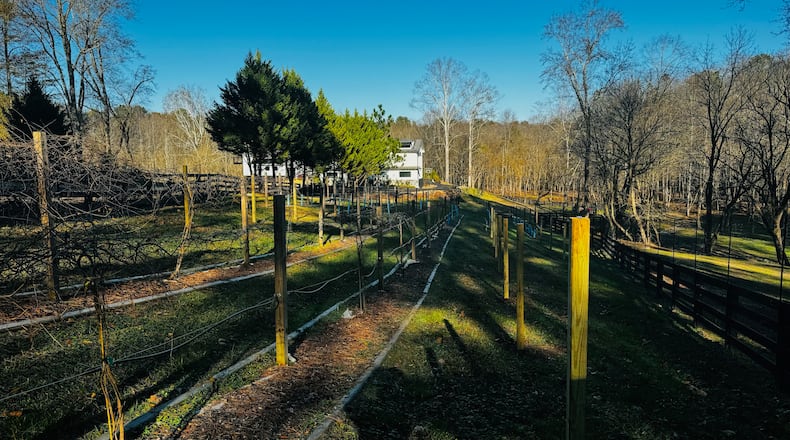A community of Milton residents say they feel pressured by city officials to figure out a compromise and overcome objections to a neighbor’s farm winery.
The winery, D’Rose Vintners, is owned by Jim and Daryn Rosenberger who are awaiting a March 4 public hearing before City Council for an alcohol license that will allow them to distribute the wine, if approved.
Residents of the Boxwood Estates and Providence Plantation subdivisions say visitors for wine tastings, and delivery trucks going to the farm winery would have to drive through their roads, resulting in increased traffic and potential danger from drunk drivers to the quiet community.
The neighbors, who have met or talked to City Council members and Mayor Peyton Jamison regarding concerns, say they feel pressed to either lay down their objections or come up with a way to compromise with the Rosenbergers on the farm winery operations. They also believe the burden is on residents to keep track of possible violations of conditions that could be attached to approval of an alcohol license, resident Craig Franklin said.
On Monday, City Manager Steve Krokoff sent an apology email to Steve Lanham, a member of the Providence Plantation Homeowners Association. “I apologize if you felt the city was placing the burden on you or your neighbors to negotiate a settlement — that was not our intention,” Krokoff said.
The Atlanta Journal-Constitution was copied on the email.
Krokoff was responding to an email from Lanham asking the city to deny the alcohol license for D’Rose Vintners and revoke the rezoning approved in 2021 that allowed for the farm winery.
When City Council approved the Rosenbergers’ property for rezoning to agricultural district, Jim Rosenberger described the farm, which is 11 of the property’s 18 acres, as a “hobby winery.” Since 2021, he has told officials that he wanted to sell his product and agreed to limit customer visits to five appointments per day and no more than 10 people at a time.
But backlash against the proposed business license and the farm winery itself recently led Rosenberger to decide that public wine tastings, packaged sales, and appointments will not be offered at the winery.
“All of the neighbors’ concerns from our perspective have gone away,” Rosenberger told the AJC. “If you can’t come here to taste wine and you can’t come here to buy wine, who’s coming here?”
Instead, the Rosenbergers have shifted to the distribution of D’Rose wine which legally requires that an alcohol license be attached to the farm winery, Jim Rosenberger said.
“There are several local restaurants that have talked about wanting to buy our wine,” Rosenberger said, adding that he foresees festivals and an online wine club that would feature his product.
Rosenberger has told the AJC that he and his wife have invested more than $500,000 in the farm winery.
There are 100 vines currently in the ground at the vineyard that could take a few years to produce grapes, he said. In the meantime, wine from other producers can be bottled at the Rosenbergers’ winery and packaged under their label.
Residents were not fully informed about plans for the neighborhood farm winery before the property was approved for rezoning.
Separate letters from the city and Rosenberger in 2021 notified residents about meetings for the rezoning but did not mention a farm winery. Rosenberger was vocal about his intentions that year during the subsequent Planning Commission and City Council meetings for the rezoning but neighbors — who now say they were unaware — were not in attendance.
Rosenberger said he was following city guidelines when he worded his letter.
Most of the community learned about the winery in 2023, neighbors say.
Sarah Moen, who is president of Providence Plantation HOA, said the winery’s impact on the environment is an added concern.
“(His property) backs up to the Cooper Sandy creek, which empties into the Etowah River, which empties into Lake Allatoona,” she said, adding that the waterways sometimes barely meet quality safety levels.
“These houses, this is all we have. It’s a liquor license in a neighborhood. At the end of the day, that’s the problem,” Moen said.
About the Author
Keep Reading
The Latest
Featured




